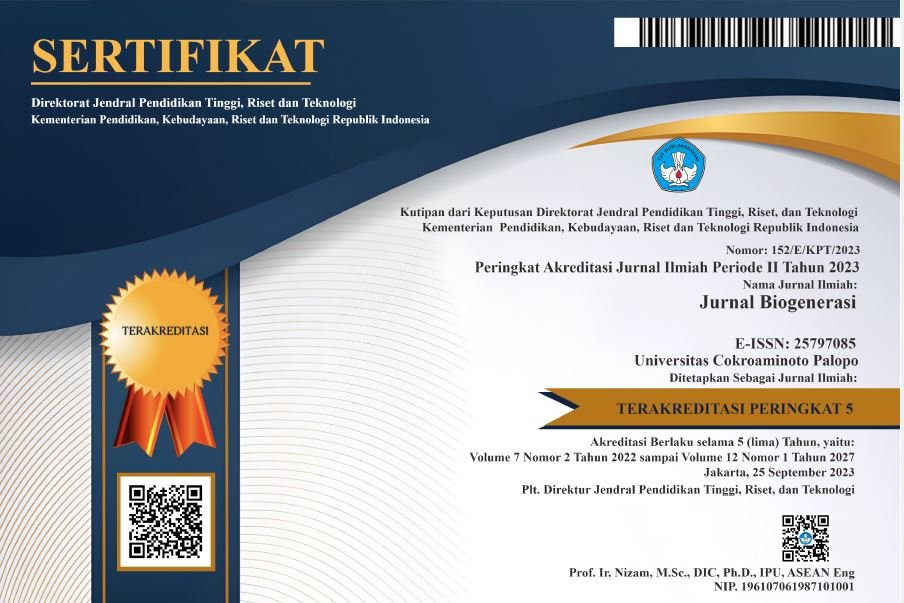PROFIL LITERASI ARTIFICIAL INTELLIGENCE (AI) GURU SMAN 1 MRANGGEN KABUPATEN DEMAK
DOI:
https://doi.org/10.30605/biogenerasi.v10i2.5720Keywords:
profile, literacy, artificial intelligenceAbstract
TPACK (Technological Pedagogical and Content Knowledge) is a basic skill for educators in today's modern era. Even TPACK is referred to as one of the factors that determines the success or failure of learning activities carried out, namely a teacher, so the quality of teachers can be an important factor in improving the quality of education. Teachers are required to have several competencies in the form of a set of mastery of abilities that must be present in teachers, especially in the use of technology, one of which is the application of AI (Artificial Intelligence). For teachers, the use of AI technology can help improve teaching skills, professional development, and provide support in learning assessment and management. This study uses a qualitative research method using a qualitative inductive analysis approach. Qualitative data is collected through activities to make notes of data and information that is heard and seen, then the data is analyzed. The results of the study show that the AI digital literacy profile of teachers at SMAN 1 Mranggen can be concluded to be in the Very Good category (85%) with the following 3 indicators: 1) Ability to use digital media, namely 87% (Very Good); 2) Critical Understanding, namely 90% (Very Good); 3) Communication Skills, namely 76% (Good).
Downloads
References
European Commission. Study assessment criteria for media literacy levels, final report. Brussels: Directorate General Information Society and Media; 2009.
Fauziyati WR. Dampak penggunaan artificial intelligence (AI) dalam pembelajaran pendidikan agama islam. Jurnal Review Pendidikan dan Pengajaran (JRPP). 2023 Nov 25;6(4):2180-7.
Haris H, Darwis MR, JY MR, Ilham M. Analisis Dampak Literasi Artificial Intelligence terhadap Perubahan Norma Dan Etika Akademik Mahasiswa. Jurnal Pendidikan Terapan. 2024 Jan 27:66-77.
Inten Paraniti AA, Ari Arjaya IB, Dewi Setiawati GA. Profil Literasi Digital Guru IPA Se-kota Denpasar. Jurnal Pendidikan Biologi Universitas Negeri Malang.;12(3):219-28.
Koehler MJ, Mishra P, Cain W. What is Technological Pedagogical Content Knowledge (TPACK)? Journal of Education. 2013;193(3):13-9. https://doi.org/10.1177/002205741319300303
Mishra P, Koehler MJ. Technological Pedagogical Content Knowledge: A Framework for Teacher Knowledge. Teachers College Record: The Voice of Scholarship in Education. 2006;108(6):1017-54. https://doi.org/10.1177/016146810610800610
Muhammad AC, Emre K. Artificial Intelligence in Education (AIEd): A High Level Academic and Industrial Note 2021. AI and Ethics. 2022;2:157-65.
Nurlaili, Qolbi Khoiri, Eva Susanti, Muhammad Agus Ainur Rasyid. 2024. Analisis Kelebihan dan Kekurangan Media Belajar AI dalam Proses Pembelajaran PAI di Perguruan Tinggi. EduInovasi: Journal of Basic Educational Studies.4 (3): 1648 – 1657. DOI: 47467/eduinovasi.v4i3.4211.
Peraturan Pemerintah Republik Indonesia. Peraturan Pemerintah Republik Indonesia No 19 Tahun 2005 Tentang Standar Nasional Pendidikan Bab VI Pasal 28. 2005.
Peraturan Pemerintah Republik Indonesia. Peraturan Pemerintah Republik Indonesia Nomor 55 Tahun 2007 Tentang Pendidikan Agama dan Pendidikan Keagamaan. 2007.
Peraturan Menteri Pendidikan dan Kebudayaan Republik Indonesia Nomor 22 Tahun 2016. Journal of Chemical Information and Modeling. 2016;53(9):1689-99.
Sartono. 21st Century Teacher Knowledge About Technology Pedagogical Content Knowledge (TPACK). Social, Humanities, and Education Studies (SHEs): Conference Series. 2021;4(5).
Sintawati M, Indriani F. Pentingnya Technological Pedagogical Content Knowledge (TPACK) Guru di Era Revolusi Industri 4.0. Prosiding Seminar Nasional Pagelaran Pendidikan Dasar Nasional (PPDN) 2019. 2019;1(1):417-22.
Wedi, S. 2024. Peran Sosial Media Dalam Proses Pembelajaran di Era Digital. Diakses tanggal 15 Februari 2025. https://smkn7tangsel.sch.id/peran-sosial-media/
Downloads
Published
How to Cite
Issue
Section
License
In submitting the manuscript to the journal, the authors certify that:
- They are authorized by their co-authors to enter into these arrangements.
- The work described has not been formally published before, except in the form of an abstract or as part of a published lecture, review, thesis, or overlay journal.
- That it is not under consideration for publication elsewhere,
- That its publication has been approved by all the author(s) and by the responsible authorities – tacitly or explicitly – of the institutes where the work has been carried out.
- They secure the right to reproduce any material that has already been published or copyrighted elsewhere.
- They agree to the following license and copyright agreement.
License and Copyright Agreement
Authors who publish with this journal agree to the following terms:
- Authors retain copyright and grant the journal right of first publication with the work simultaneously licensed under Creative Commons Attribution License (CC BY 4.0) that allows others to share the work with an acknowledgment of the work's authorship and initial publication in this journal.
- Authors are able to enter into separate, additional contractual arrangements for the non-exclusive distribution of the journal's published version of the work (e.g., post it to an institutional repository or publish it in a book), with an acknowledgment of its initial publication in this journal.
- Authors are permitted and encouraged to post their work online (e.g., in institutional repositories or on their website) prior to and during the submission process, as it can lead to productive exchanges, as well as earlier and greater citation of published work.


.png)

